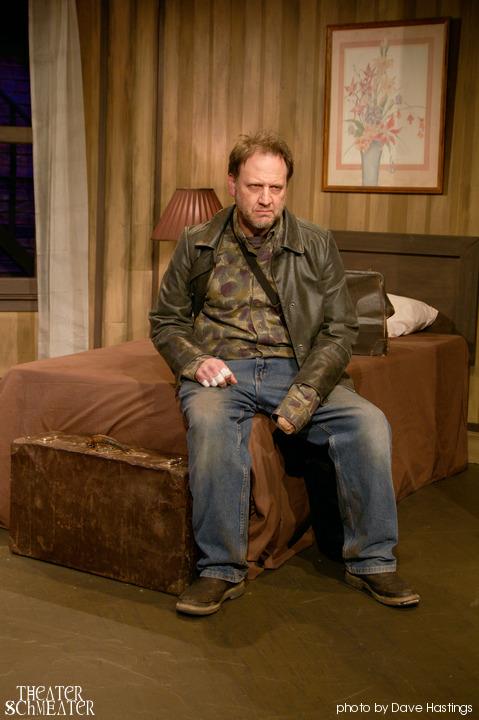
Terry Edward Moore, standing, and Aidyn Stevens in “A Day in the Death of Joe Egg”. Photo by John Ulman
Review: “A Day in the Death of Joe Egg” by Peter Nichols. Produced by Thalia’s Umbrella. Directed by Daniel Wilson. With Terry Edward Moore, Leslie Law, Brandon Whitehead, Carol Roscoe, Susan Corzatte and Aidyn Stevens. Now through February 17 at ACT.
Review: “A Behanding in Spokane” by Martin McDonagh. Directed by Peggy Gannon. With Gordon Carpenter, Brandon Ryan, Corey Spruill, and Hannah Mootz. Now through February 23 at Theater Schmeater.
No, handicaps or disabilities aren’t really funny but two playwrights have written darkly comic works that use such tragedies to terrific comic effect. Yes, they are both dark and they are both disturbing and you might even laugh a bit through your tears, as long as you aren’t the sort to be freaked out by birth defects or the search for a missing hand. One play is slightly more sentimental than the other, which borders on the gruesome, and, both productions have their roots across the Atlantic. And, both productions are definitely worth a viewing.
We’ll start with the slightly more sentimental of the two, Thalia Umbrella’s production of Peter Nichols’ 1967 play, “A Day in the Death of Joe Egg” the bittersweet tale of Brian and Sheila and their devoted care of their daughter “Joe” who is both mentally and physically impaired. The years of caring for Joe has started to put a strain on Brian and Sheila’s marriage with Sheila determined to home care her daughter, and Brian pushing for institutionalization. Both parents use black humor to cope with the demands of caring for Joe, which can be shocking to outsiders.
“Joe Egg”, is the premiere production of a new theater company in town, Thalia’s Umbrella which features a number of familiar local theater faces among its founders, including director Daniel Wilson and Terry Edward Moore who stars as the husband Brian. The pair have cast an impressive roster of talented actors including Leslie Law as Sheila; Brandon Whitehead and Carol Roscoe as family friends Freddie and Pam, and beloved veteran Seattle actress Susan Corzatte as Brian’s mother Grace. It’s an all-star line-up and the acting is the chief highlight of this production with especially strong performances from Ms Law and Mr. Whitehead as the blustering but well meaning friend. And, despite being staged in the confines of ACT’s Bullitt Cabaret space, the designers have done an fine job of creating the look and sound of late sixties England with an appropriately designed bohemian flat set by Jason Phillips and some swinging fashions from costume designer Deane Middleton. It’s a professionally executed production of a play that still manages to resonate despite its age.
The only major problems with this production are, ironically, due to the work of its co-founders. Mr. Wilson’s staging is to be admired; the Bullitt Cabaret’s limitations for anything other than, well, cabaret are notorious but the director does a fine job moving his actors around the odd confines of the space. But, while Act 2 of the play moved along with a brisk pace, (largely due to the presence of new characters and the deliciously larger than life performance of Mr. Whitehead), Act 1 which only centers on Brian and Sheila, and to a smaller extent, Joe, had moments that dragged a bit…part of that could be performance based but the entire act lacked pacing and desperately needed some tightening.
As for Mr. Moore, he has the very difficult job of playing a “sad clown” which is a lot more difficult than it sounds. Brian uses his smart aleck humor to cope with the difficult situation of raising a handicapped daughter and there is always the great danger that playing such a character can easily fall into twee pathos in the style of Robin Williams, in his “laughing through the tearjerking” roles he liked to play in between doing dumber than thou comedies. Mr. Moore veers over into that muggy land a time or two during the course of the production and while we can sympathize that it’s a tricky trap to avoid with the nature of the role, it’s also one that must be avoided at all costs…it’s a La Brea tar pit of thespian doom. The actor is very compelling in the role but a stronger sense of direction might have helped avoid those moments. Sometimes, it’s not a good idea for friends to direct friends.
That being said, “A Day in the Death of Joe Egg” is still a powerful piece of theater and Thalia’s Umbrella’s strong production of the play will hopefully lead to more work from the infant company…and, hopefully some work from contemporary playwrights.

Gordon Carpenter as Carmichael in Theater Schmeater’s production of “A Behanding in Spokane”. Photo: Dave Hastings
Meanwhile, about 6 blocks up the Hill, there’s a different kind of handicap being laughed about…Theater Schmeater’s current staging of Irish playwright Martin McDonagh’s “A Behanding in Spokane”, the writer’s first work with an American setting. It’s the usual darkly perverse work we’ve come to expect from Mr. McDonagh who isn’t one to shy away grim humor and very comically violent situations, (his play “The Lieutenant of Inishmore” and his film, “In Bruges” come to mind as fine examples).
“A Behanding in Spokane” concerns the efforts of a man named Carmichael to seek retribution for his “behanding”…as a young man, he was brutally attacked where he lost said hand and ever sense has been on a mission to claim vengeance on those who disfigured him AND to physically locate and claim the hand that was severed. (It was apparently kept after the incident as a souvenir.) As the play opens, Carmichael is in a seedy motel in an even seedier part of town, negotiating with a rather dimwitted young couple for the return of his hand while also dealing with a very nosy motel desk clerk curious about the violent activities going on in Carmichael’s room as well as coping with the ongoing crisis, via telephone, with his elderly and racist mother. There are gunshots, Molotov cocktails, a large number of decaying hands, handcuffs, surprising confessions, a bit of bravado/bravery and enough uses of the “N Word” to make the politically correct blanch in horror, and while it never makes complete sense, “A Behanding in Spokane” is still a very dark, nasty and funny comedy and the Schmee has done an excellent job in staging it, with strong direction from Peggy Gannon; terrific sound and music from Al Angel; a convincing seedy motel set designed by Michael Mowery and four excellent performances. It’s highly recommended…for those of you who like dark nasty plays about dark nasty people.
And, all four characters are a bit nasty, though some are nastier than others. The violent prone Carmichael is a racist killer but the dimwitted couple is foolishly trying to con him out of money and the odd desk clerk is willing to risk lives for his own perverse pleasure so perhaps Mr. McDonagh’s point is that everyone is capable of perversity. Gordon Carpenter’s tightly wound performance as Carmichael manages to be both fearsome…and endearing as the character goes from cold blooded violence to tenderly dealing with his elderly mother. He’s matched by Hannah Mootz as Marilyn and Corey Spruill as Toby, the dumb local couple trying to outwit Carmichael. Their performances superbly convey the naivete and cupidity of the characters as well as their charm and wit.
But, the juiciest performance of the night belongs to Brandon Ryan and his quirky take on a character that was already pretty quirky to start with. His Mervyn is a slacker loser stuck in a crappy job in a crappy town and while Mervyn seems a bit resigned to his fate, he’s also curious to see and experience other aspects of life, even if that means risking his own life. The character is foolishly fearless but the performance never is…Mr. Ryan is known for his bigger than life performances, which on occasion have gotten a bit out of hand, but here he is perfectly cast and exquisitely directed in text he was born to interpret. And, while the kookier lines and situations are obviously right up his alley, Mr. Ryan is equally at home with the smaller, quieter moments in the play as he reveals the tenderness and essential loneliness of the character. Good acting is all about interpreting the subtext of the material and playing those underlying motifs and emotions within the larger context of the play. Mr. Ryan’s performance indicates he is fully aware of that subtext and the subtle charm and warmth of the performance are grounded in his interpretation. It’s a must not miss performance in solidly entertaining production.

















